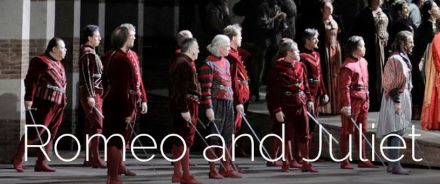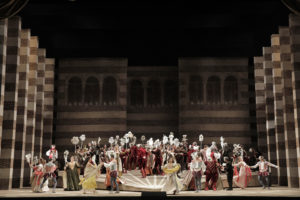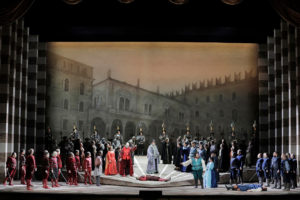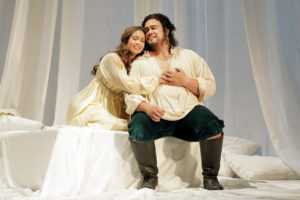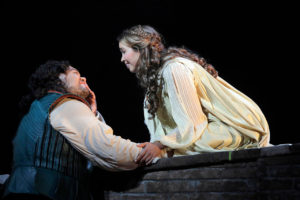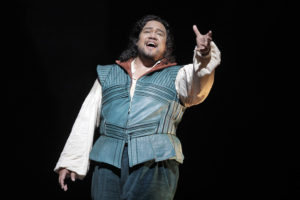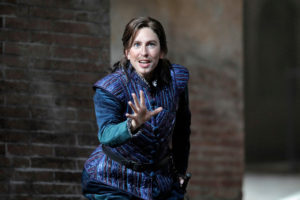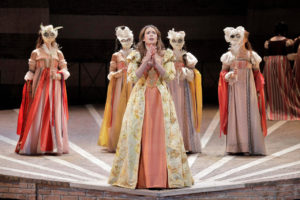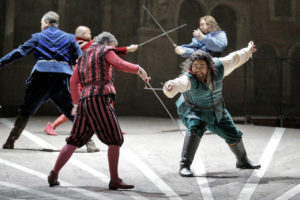VERONA: FAIR;
ROMEO AND JULIET: KILLER
First performed in its inaugural season of 1923, San Francisco Opera begins its 97th season with a production new to SFO of Charles Gounod’s Roméo et Juliette (Romeo and Juliet), an adaptation of Shakespeare’s timeless tale. One of the French composer’s finest works, and an excellent example of French opera, it successfully debuted in 1867. Although the plot needs no introduction, it should at least be mentioned that, though Gounod’s librettists Jules Barbier and Michel Carré followed Shakespeare closely, they did shorten and condense the play, invent a new character (Romeo’s page Stéphano), and alter the final suicide scene. This work, while not exactly a rarity, is nonetheless produced less often than its gorgeous music merits.
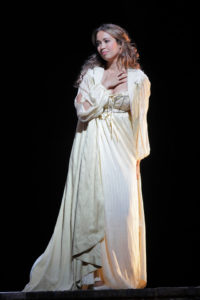 Making his American directorial debut, Opéra de Monte-Carlo Director Jean-Louis Grinda brings his 2012 staging of this Opéra de Monte-Carlo and Teatro Carlo Felice co-production to the War Memorial Opera House through October 1. In attempting to merely suggest the Verona of the original play, we get an eyeful of oddities — in fact, Eric Chevalier‘s set doesn’t even appear as three-dimensional until an archway is lit from behind in Act III. Renaissance-era paintings hang as backdrops, an undramatic scrim of bricks with a shadow of two lovers (which remained down while the amazing SFO chorus sang the prologue spectacularly well), there is a rotating platform that offers no levels for intrigue, and the stage feels oddly empty. At the cost of an opera ticket, it’s almost insulting that we are left to use our imagination to fill in what is not on stage. Additionally, Carola Volles‘s costumes are strangely similar — men in red velvet and black; women in lightly colored stripes. And while the players keep moving, there’s a paucity of psychological complexity. There’s no ballroom for the opening scene (but there are eight exquisite dancers down front), no garden from which Romeo can call to Juliet, no wedding chapel and no crypt in which to die. Sometimes these locations are evoked by lowering down art and large white fabric, but such feeble touches seem amateurish in a world-class opera house.
Making his American directorial debut, Opéra de Monte-Carlo Director Jean-Louis Grinda brings his 2012 staging of this Opéra de Monte-Carlo and Teatro Carlo Felice co-production to the War Memorial Opera House through October 1. In attempting to merely suggest the Verona of the original play, we get an eyeful of oddities — in fact, Eric Chevalier‘s set doesn’t even appear as three-dimensional until an archway is lit from behind in Act III. Renaissance-era paintings hang as backdrops, an undramatic scrim of bricks with a shadow of two lovers (which remained down while the amazing SFO chorus sang the prologue spectacularly well), there is a rotating platform that offers no levels for intrigue, and the stage feels oddly empty. At the cost of an opera ticket, it’s almost insulting that we are left to use our imagination to fill in what is not on stage. Additionally, Carola Volles‘s costumes are strangely similar — men in red velvet and black; women in lightly colored stripes. And while the players keep moving, there’s a paucity of psychological complexity. There’s no ballroom for the opening scene (but there are eight exquisite dancers down front), no garden from which Romeo can call to Juliet, no wedding chapel and no crypt in which to die. Sometimes these locations are evoked by lowering down art and large white fabric, but such feeble touches seem amateurish in a world-class opera house.
But the way this cast sounded, I didn’t care a whit.
The night belonged to those in the title roles, Nadine Sierra and Pene Pati. Not long before opening night, Pati replaced Bryan Hymel, who withdrew “for personal reasons.” The two have chemistry, and all four of their duets live up to the hype.
When Sierra gave us colorful coloratura, giddy excitement, and a bit of nervousness to Juliette’s first aria, “Je veux vivre,” everyone was hooked by her magnificence, positively brimming with youth. She reached her pinnacle in the Act IV scene in which she commits to Friar Lawrence’s questionable strategy that she drink a potion to make her appear dead, a scene that climaxed in her commanding rendition of the taxing aria “Amour, ranime mon courage.” The poor thing has to sing about that vial for some time (dramatically, it’s not a great scene), but Sierra’s world-class soprano made it a treat.
Mr. Pati quite simply blew me away. As the impetuous, teenaged Romeo, his barrel chest and full-throated tenor was backed by the lighter, more delicate style of Gounod. When he laid out that High C, I do believe it is both the longest and strongest I’ve heard in years and years. And his “L’amour’¦ Ah! leve-toi, soleil” below Juliet’s window was breathtakingly beautiful.
Of the many supporting principals, mezzo-soprano Stephanie Lauricella — who makes her SFO debut — deserves great praise as Stéphano; her lyrical singing of “Que fais-tu, blanche tourterelle” beautifully captures Gounod’s flair for witty and melodic phrasing. Also making her debut here is mezzo-soprano Eve Gigliotti as Juliet’s nurse Gertrude, adding a welcome measure of comedy to this tragic tale. James Creswell as Friar Lawrence has a beautiful, full-bodied and profound voice, never forced in the low register, and Lucas Meachem offers a pile-driving Mercutio.
A frequent guest with the world’s great opera companies, conductor Yves Abel moves the music forward ever so deftly, keeping it wonderfully lithe and lively. Romeo and Juliet comprises a delicious combination of Elizabethan drama and French Romanticism. Gounod’s delightful interpretation should be heard, if not seen, by all.
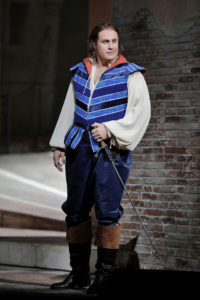 photos by Cory Weaver/San Francisco Opera
photos by Cory Weaver/San Francisco Opera
Romeo and Juliet
San Francisco Opera
War Memorial Opera House, 301 Van Ness Ave
in French with English supertitles
ends on October 1, 2019
for tickets, call 415-864-3330 or visit SF Opera
$10 standing room tickets go on sale at 10 a.m. on the day of each performance
